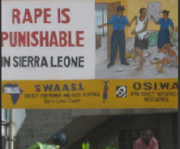
Sierra Leone (MNN) — According to the U.S. Central Intelligence Agency, trafficking in persons is defined as modern-day slavery. Human trafficking fuels conflicts, terrorism, disease and organized crime. That, in turn, fuels problems that go all the way to the top. Its victims are forced, defrauded, or coerced into labor or sexual exploitation.
In 2002, a United Nations report indicated Sierra Leone was a source, transit point and destination for human trafficking.
Seven years ago, Sierra Leone's response to the issue was lukewarm. As more light was shed on the problem, more leaders began calling for change.
In June 2009, the African Union Commission launched an initiative against trafficking in human beings, AU.COMMIT Campaign, among African population within the continent and in the Diaspora.
Then, Sierra Leone set a precedent with its third-ever conviction under the country's 2005 Anti Human-Trafficking Act. Abdul Aziz Bundu was convicted of nine counts, including human trafficking, and sentenced to 22 years behind bars.
Yemi Oshodi with World Hope International (WHI) says this conviction sent a message: "It really paved the way for people who are victims of trafficking toensure that they get their justice."
WHI is part of an organization called Faith Alliance Against Slavery and Trafficking (FAAST). This group took the lead on educating the Sierra Leonean society about the injustices of human trafficking.
"Now, we're working with the government to train members of the judiciary to insure that we can help to strengthen the government's response to trafficking in persons", says Oshodi. To be more specific, FAAST participates in the Sierra Leone Government's Trafficking in Persons (TIP) Task Force.
It comprises the Sierra Leone Police, Drug Enforcement Agency, Ministry of Social Welfare, Immigration, National Revenue Authority, Law Officers Department, Office of National Security, UN Mission in Sierra Leone, U.S. Embassy and some international NGOs.
Does this open doors for the Gospel? Oshodi explains, "Our teams, all of whom are very strong, devoted Christians, use this as an opportunity to show Christ's love. We believe that no person should be enslaved and no person should be forced to do something against their will. We make every effort to show that Christ also hates injustice."
There is still a long way to go. WHI helped launch an inter-governmental review of the law in order to create a better implementation and harsher sentencing of traffickers.
WHI's Web site sums up the challenge succinctly. Their team writes, "Do not be intimidated by the statistics or get discouraged by the magnitude of the challenges this world presents. By helping one person, one human being at a time, we will change the world."
You can help. Details can be found here.
